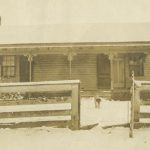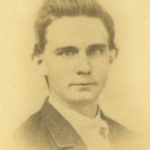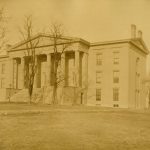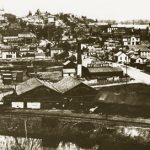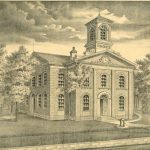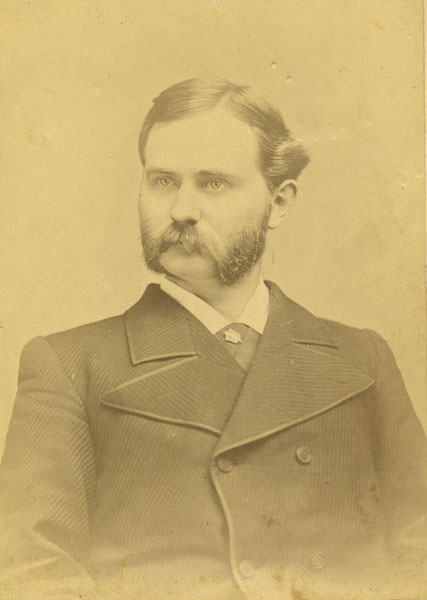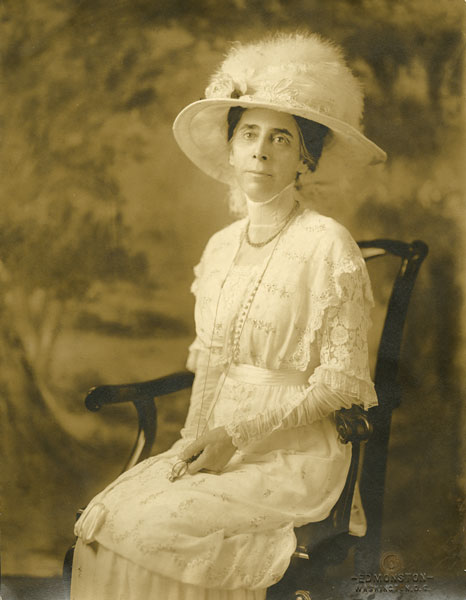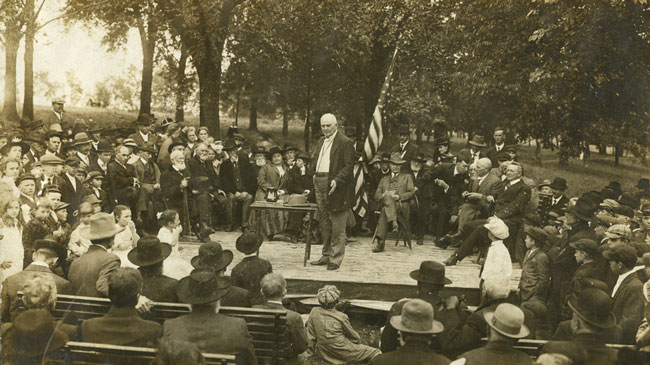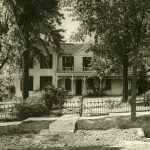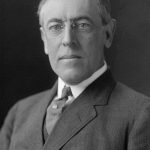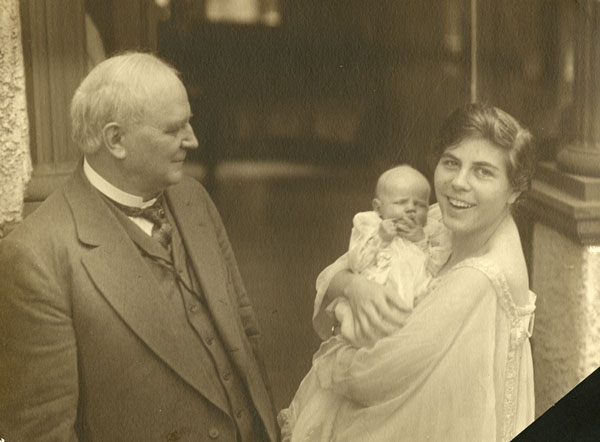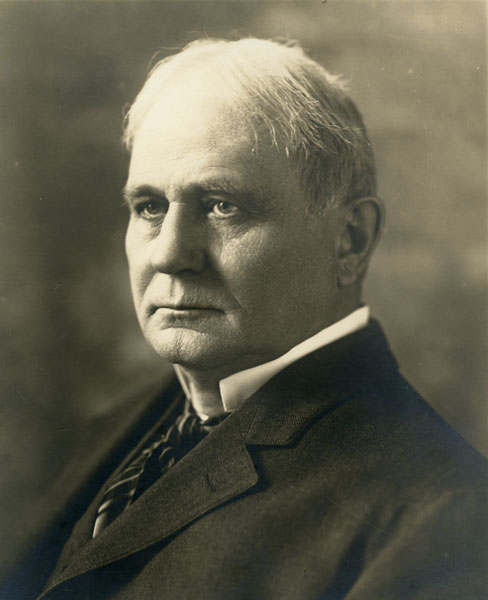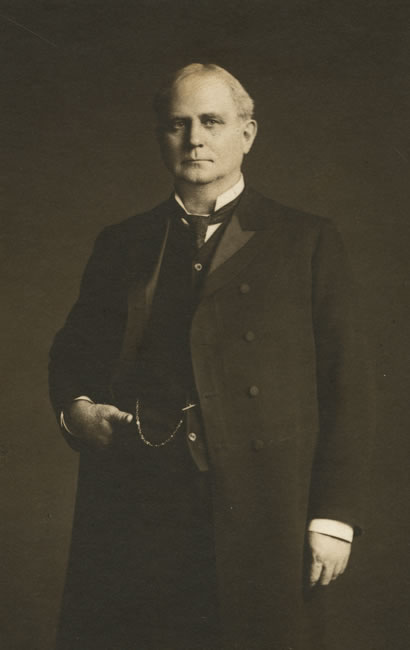
Champ Clark

Introduction
James Beauchamp “Champ” Clark was a prominent Democratic politician from Missouri. Clark served in the U.S. House of Representatives for twenty-six years. He was Speaker of the U.S. House of Representatives from 1911 to 1919. In 1912 Clark unsuccessfully sought the Democratic nomination for President, losing to Woodrow Wilson.
Early Years
James Beauchamp “Champ” Clark was born on March 7, 1850, near Lawrenceburg, Kentucky. He was the third child and only son of John H. and Aletha Beauchamp Clark. Champ’s father unsuccessfully engaged in a number of different professions, including wagon making, dentistry, and teaching.
After Aletha Clark died when Champ was three years old, John Clark left his two surviving children with an elderly, childless couple. Champ’s father later hired him out to a local farmer. It was, Champ recalled, “perhaps the best thing that ever happened to me. It kept me out-of-doors, developed my body, taught me habits of industry, and made me love agriculture.”
When he was not working, Champ attended school and read as many books as he could. One of the books Champ read was William Wirt’s Life of Patrick Henry. Champ later said the book “made it appear that winning lawsuits and going to Congress were as easy as falling off a log.” He added, “I have not found it so; but that book determined me to be a lawyer and a Congressman before I had ever seen a lawyer, a law book, a court house, or a Congressman.”
Education
In 1867, when he was seventeen, Champ enrolled at Kentucky University (now Transylvania University) in Lexington. Although his family tried to help Clark financially, it was not enough, so he taught school during the summer months to earn money. In a short period of time, Clark was ranked first in his university class.
Clark’s time at the university came to a premature end after he fired his pistol at one of his roommates in self-defense during a quarrel. He was expelled and returned home. After two years, Clark was invited to return to Kentucky University, but he instead chose to attend Bethany College in Bethany, West Virginia. He graduated first in his class in 1873.
Shortly after graduation, Clark was elected president of Marshall College. At age twenty-three, he was the youngest college president in the history of the United States. Clark used the money from his $1300 yearly salary to enroll at the Cincinnati School of Law. It was during this time that he shortened his name to “Champ” because, according to Clark, there was “one J.B. Clark at every post-office in America.” He graduated at the top of his law class in 1875 and headed to Kansas to seek his fortune.
Coming to Missouri
Despite glowing reports of economic opportunity in Kansas, Clark was unable to find employment. He traveled to Missouri and accepted a job as the Assistant Superintendent of Schools in Louisiana, Missouri. Clark resigned after one year and began practicing law. In 1877 he was elected Louisiana city attorney. Clark ran unsuccessfully for the state legislature in 1878, but remained active in Democratic politics.
A Career in Politics
In 1880 Clark was elected city attorney of Bowling Green, Missouri, but soon resigned to serve as Assistant Prosecuting Attorney in Pike County. His skill as a lawyer helped secure his election as the Prosecuting Attorney of Pike County, Missouri. After years of struggling to build a career, Clark was finally gaining ground. He married Genevieve Bennett on December 14, 1881.
The Clarks’s first two children, Champ and Anne, died in infancy. The couple had two surviving children, Joel Bennett and Genevieve.
In 1888 Clark successfully ran for the Missouri state legislature. Emboldened by his success, he sought the Democratic nomination to the U.S. House of Representatives for Missouri’s Ninth District in 1890, but failed. Champ Clark was not one to give up easily.
Two years later Clark was elected to the U.S. House of Representatives, only to be defeated in the election of 1894. He was reelected in 1896 and served the next twelve terms—twenty-four years—until 1921.
Mr. Speaker
During his tenure, Clark served twice as minority leader. In 1911 he was elected Speaker of the House due to his reputation as a skillful orator and party loyalist. Although Clark championed the causes of his constituents and the Democratic party, he failed to sponsor any significant legislation during his time in office.
As a politician, he supported agrarian interests over corporate interests, women’s suffrage, the establishment of an income tax, and the direct election of U.S. Senators.
1912 Democratic Presidential Nomination
When the 1912 Democratic National Convention convened in Baltimore, Clark was nominated for the presidency. In the early rounds of voting, he received a large number of votes, but not the required two-thirds majority needed to secure the nomination. After forty-six rounds of voting, Clark lost the nomination to New Jersey governor Woodrow Wilson, who was elected the twenty-eighth President of the United States. It was a terrible blow to Clark, but he remained loyal to the Democratic party. Clark helped ensure the passage of Wilson’s progressive “New Freedom” legislative agenda which remains one of the most ambitious legislative programs in American political history.
In 1915, during one of Clark’s many return visits to Bowling Green, a mob attempted to break into the county jail to lynch an African-American laborer suspected of killing his white employer. Champ Clark, his son Bennett, and other prominent citizens responded to the sheriff’s call for assistance, but the mob fled by the time help arrived.
1920 Defeat
After the end of World War I in 1918, voters were disillusioned with Woodrow Wilson and the Democratic Party. During the 1920 presidential election, Republican candidate Warren G. Harding promised a return to “normalcy”. Harding proved extremely popular with the American public. He easily defeated Democratic candidate James M. Cox for the presidency.
Harding’s victory was part of a Republican landslide that swept Democrats at all levels out of office, including Champ Clark. Clark was defeated in his bid for reelection by Republican newcomer Theodore W. Hukriede.
Although his political defeat was a great blow to Clark, an even greater loss occurred a year later when his grandson Champ Clark Thompson died of pneumonia. After the boy’s death, Genevieve Clark Thompson sadly observed, “My father quit living.”
Legacy
Champ Clark died on March 2, 1921, just five days before his seventy-first birthday. His funeral was held in the hall of the U.S. House of Representatives in Washington, D.C. He is buried in the Bowling Green City Cemetery in Bowling Green, Missouri.
Champ Clark remains the only Speaker of the House from Missouri and one of the most distinguished politicians in Missouri’s history.
Text and research by Kimberly Harper
References and Resources
For more information about Champ Clark’s life and career, see the following resources:
Society Resources
The following is a selected list of books, articles, and manuscripts about Champ Clark in the research centers of The State Historical Society of Missouri. The Society’s call numbers follow the citations in brackets.
Articles from the Missouri Historical Review
- White, Hollis L. “Champ Clark, the ‘Leather-Bound Orator.’” v. 56, no. 1 (October 1961), pp. 26-39.
Articles from the Newspaper Collection
- “Account of How He Received His First Ten Dollars.” Jefferson City Democrat Tribune. January 25, 1918, p. 4. [Reel # 16331]
- “Elected Speaker of United States House of Representatives.” Jefferson City Democrat Tribune. April 5, 1911, p. 1. [Reel # 16318]
- “Funeral Services in House Chamber for Champ Clark.” St. Louis Post-Dispatch. March 3, 1921, p. 2. [Reel # 42138]
- “Not Beverly or Oyster Bay, But Bowling Green, Missouri: Will This Little ‘Show Me’ State City, Hardly More Than a Village, Become Uncle Sam’s Summer Capital?” St. Louis Republic. May 26, 1912. [Reel # 45014]
Books and Articles
- Allen, Betty Jane. “Mr. Speaker.” Missouri Life. v. 5, no. 6. (January-February 1978), pp. 42-47. [F586 M6912 v. 5 (1977-78)]
- Christensen, Lawrence O., William E. Foley, Gary R. Kremer, and Kenneth H. Winn, eds. Dictionary of Missouri Biography. Columbia: University of Missouri Press, 1999. pp. 186-188. [REF F508 D561]
- Clark, Champ. My Quarter Century of American Politics. New York: Harper, 1920. [REF F508.1 C547c v.1-2]
- Morrison, Geoffrey F. “America’s Ring-Tailed Roarer: Speaker of the House Champ Clark.” Gateway Heritage. v. 10, no. 4 (Spring 1990), pp. 56-63. [REF F550 M69gh v.10-11 (1989-91)]
- Morrison, Geoffrey F. A Political Biography of Champ Clark. Ph.D. Dissertation, St. Louis University, 1972. [REF F508.1C547m 1986]
- U.S. Congress. Champ Clark (Late a Representative from Missouri) Memorial Addresses Delivered in the House of Representatives of the United States. Washington, DC: Government Printing Office, 1922. [REF F508.1 C547u]
- Webb, W.L. Champ Clark. New York: Neale Publishing Co., 1912. [REF F508.1 C547w]
Manuscript Collection
- Clark, Champ (1850-1921) and Bennett Champ (1890-1954), Papers, 1853-1973 (C0666)
DIGITIZED MATERIALS
Political and personal papers of James Beauchamp “Champ” Clark, a Democratic U.S. congressman from Missouri, 1893-1895 and 1897-1921, and his son Bennett Champ Clark, a Democratic U.S. senator from Missouri, 1933-1945. Also includes materials of other family members. Collection contains correspondence, financial and legal documents, journals, photographs, speeches and writings, and clippings and scrapbooks.
Outside Resources
These links, which open in another window, will take you outside the Society’s website. The Society is not responsible for the content of the following websites:
- National Register of Historic Places Nomination Form
This website contains the nomination form for Champ Clark’s residence, known as Honey Shuck, and provides information about Clark and his Missouri home.

